Edie Melson's Blog, page 77
September 9, 2023
The Breaking Point in Life and Writing
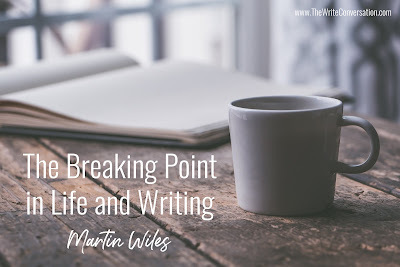
by Martin Wiles @LinesFromGod
My life changed in five seconds. Well . . . maybe ten.
“You have broken your femur at the neck, just where it connects to the hip ball,” the doctor said.
Did that mean I had broken my femur . . . or my hip?
What he said before surgery confused me even more. “I am going to insert two screws. We’d rather your own bones heal, but if this doesn’t work, we’ll do a hip replacement.”
I’d known quite a few people who’d had hip replacements. In fact, I’d known a fair amount of older people who died shortly after breaking their hip. I wasn’t interested in either. Why hadn’t I listened to the silent message to stop wearing those blasted Crocks? I knew I shuffled my feet in them. I remembered almost falling more times than I could count. I knew I was over sixty and not as steady on my feet. But no, I had to be cool.
Then, it happened. The stumble. The forward motion. The excruciating pain. I hoped I had only bruised my hip, but I had a bad feeling deep inside. Several hours later, the tests and scans confirmed my fears. My breaking point was the top of my femur. My life would change for weeks and months to come.
The breaking point refers to that point when we’re at our wit's end . . . when we feel as if we’ve reached the end of our rope. People or circumstances challenge us. We don’t think we can go on. Things must change.
“Job scraped his skin with a piece of broken pottery as he sat among the ashes” (Job 2:8 NLT).
Job was there. God allowed Satan to destroy almost everything he had: property and people. Job was a man of integrity and accepted good and bad from God. His wife? Not so much. She encouraged her husband to curse God and die. Get it over with. Let the breaking point . . . break.
We never know what our breaking point will be or what circumstances will lead us to it. But we’ll all experience a few of them during our life. Life is difficult. Trials are rife. And we writers are no different.
Our breaking points often come at inconvenient times. Trials are no respecter of persons . . . or writers. Deadlines loom. The agent or editor wants the revised article, devotion, or MS back by . . . WHEN!!!! In the middle of our busyness—our writing life—a fall occurs, a diagnosis happens, a loved one dies, a child rebels. The list is endless. We could throw up our hands (or keyboards) and quit—and we might have to hit the pause button for a few days or weeks—but God calls us to keep writing His words of love to others, fiction and nonfiction.
The good news is that God is working behind the scenes to bring good from our bad. The one who can heal our breaks—literal and otherwise. My hip will heal, one way or the other. My circumstances will return to some semblance of normal, although when, I’m not sure. And after all, I could have broken both knees and both wrists instead of a hip. For what I do, that would have been more traumatic.
God doesn’t send or allow trials to destroy us, but to grow our faith in Him . . . to increase our dependence on Him. And when that happens, our faith matures, and we begin to see the positive side of things instead of the negative.
What are some healthy ways you can respond when your breaking point comes so you can keep writing and not give up?
Don’t forget to join the conversation below.
TWEETABLEThe Breaking Point in Life and #Writing from Martin Wiles (@LinesFromGod) on @EdieMelson (Click to Tweet)
 Martin Wiles is the founder of Love Lines from God (WWW.LOVELINESFROMGOD.COM) and serves as Managing Editor for Christian Devotions and Directing Editor for VineWords. He has authored six books and has been published in numerous publications. His most recent book, DON'T JUST LIVE...REALLY LIVE, debuted in October of 2021. He is a freelance editor, English teacher, author, and pastor.
Martin Wiles is the founder of Love Lines from God (WWW.LOVELINESFROMGOD.COM) and serves as Managing Editor for Christian Devotions and Directing Editor for VineWords. He has authored six books and has been published in numerous publications. His most recent book, DON'T JUST LIVE...REALLY LIVE, debuted in October of 2021. He is a freelance editor, English teacher, author, and pastor.
Published on September 09, 2023 22:00
September 8, 2023
Writers and the Artistry of Love
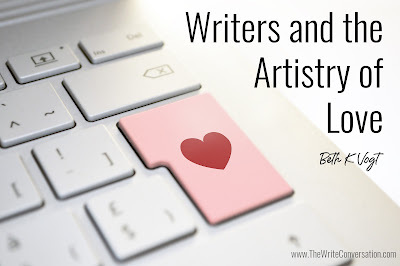
by Beth K. Vogt @BethVogt
I stumbled across a new-to-me quote and knew I had to share it with you this month, writer friends. Even as I type these first sentences, I’m still unraveling the beautiful truth hidden within the ten words of master artist, Vincent van Gogh.
“There is nothing more truly artistic than to love people.”
Ponder those words for a moment, fellow creatives. Reread them and allow them to strike a chord in your soul as they did in mine.
Consider the word “artistic.” It means imaginative and creative—and loving someone else in ways that build a lasting relationship, a long-term commitment, requires we go beyond the ordinary, doesn’t it?
But wait … let’s also remember we love because God first loved us. (1 John 4:19) God, our Creator (Elohim), created us to love Him and to love one another. We’re made in His image, and we reflect Him to the world through our actions and interactions with others.
Still with me, friends?
“There is nothing more truly artistic than to love people.”
Van Gogh was correct when he said loving people is the highest form of creativity because loving other people is the most beautiful, most caring way to reflect our Creator-God to the world and to fulfill part of our spiritual calling.
Let’s think about that for a moment. How can we, as writing creatives, love others today?
5 Ways Writing Creatives Can Love Others TodayWrite someone an encouraging note.Speak words of encouragement to a family member or friend.Offer our talents to someone in need—editing a scene or brainstorming back cover copy or offering feedback on a book cover.Mentor a newer writer.Celebrate another author.
No matter what you do—be you. Let your words and your actions reflect who God made you to be. Mixed with love, your actions will be certain to encourage someone else.
TWEETABLEWriters and the Artistry of Love from author @BethVogt on @EdieMelson (Click to Tweet)
 Beth K. Vogt believes God’s best often waits behind the doors marked “Never.” She’s authored 15 novels and novellas, both contemporary romance and women’s fiction. Beth is a Christy Award winner, an ACFW Carol Award winner, and a RITA® finalist. Her newest contemporary romance novel, Dedicated to the One I Love, released June 20, 2023. Her novel Things I Never Told You, book one in her Thatcher Sisters Series by Tyndale House Publishers, won the 2019 AWSA Golden Scroll Award for Contemporary Novel of the Year. An established magazine writer and former editor of the leadership magazine for MOPS International, Beth blogs for Learn How to Write a Novel and The Write Conversation and also enjoys speaking to writers group and mentoring other writers. She lives in Colorado with her husband Rob, who has adjusted to discussing the lives of imaginary people. Connect with Beth at bethvogt.com.
Beth K. Vogt believes God’s best often waits behind the doors marked “Never.” She’s authored 15 novels and novellas, both contemporary romance and women’s fiction. Beth is a Christy Award winner, an ACFW Carol Award winner, and a RITA® finalist. Her newest contemporary romance novel, Dedicated to the One I Love, released June 20, 2023. Her novel Things I Never Told You, book one in her Thatcher Sisters Series by Tyndale House Publishers, won the 2019 AWSA Golden Scroll Award for Contemporary Novel of the Year. An established magazine writer and former editor of the leadership magazine for MOPS International, Beth blogs for Learn How to Write a Novel and The Write Conversation and also enjoys speaking to writers group and mentoring other writers. She lives in Colorado with her husband Rob, who has adjusted to discussing the lives of imaginary people. Connect with Beth at bethvogt.com.
Published on September 08, 2023 22:00
September 7, 2023
Know How to Set Writing Priorities with Confidence by Creating an Author Mission Statement
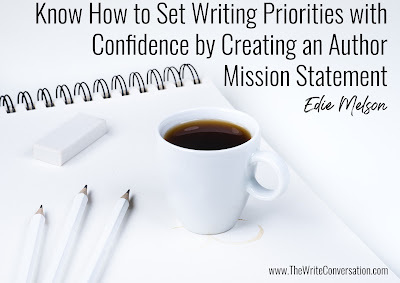
by Edie Melson @EdieMelson
Life is getting busier for all of us. And every writer I know is overwhelmed with the to-do list they’re facing and, beyond that, the opportunities to go many different directions.
So how do we decide what to do first and which writing opportunities to pursue?
The best answer is, “We follow God’s leading.”
And while I agree one-hundred-percent with that answer. I also know that sometimes it’s hard to figure out which priority is God’s leading and which one isn’t.
So let’s go a little deeper and look at what following God’s leading looks like when we live it out.
Why Develop an Author Mission Statement
Developing an author (or writing) mission statement is one of the smartest things I’ve ever done to facilitate being certain about what God is saying. My mission statement has allowed me to boil down—through prayer and seeking God’s presence—what His specific calling is for my life. And now that I have this statement, it has acted as a filter. My author mission statement gives me a way to evaluate everything that comes my way—from opportunities to offer counsel to projects to work on.
As I’ve said over and over on this blog, each of us is a unique creation. God has a plan and a purpose for our lives—and our writing. While it’s important to grow and explore, we flourish best from a foundation of being who God planned us to be. Today I’m going to share my own process of how to write an author mission statement.
Crafting an author mission statement isn’t usually a quick project. But it’s vital that each writer has one. It will help us evaluate opportunities and give us confidence to move forward because we know who we are.
The Process of Writing an Author Mission Statement
In your journal or notebook, begin the process by answering each question below in a single sentence.What do you do? Yes, you write. But go deeper than that. Who do you do it for? What makes you unique?What is the God-sized part of your calling? (Make it big—only God can attain it)What can your readers expect?
Play with the statements you’ve written. Some of them may meld together into a single sentence. After you’ve got an idea of where you’re headed, add an “I believe” statement to the beginning.
Here is my author mission statement:
I believe God has a purpose for everyone’s unique story. I encourage others to live that story by telling stories of my own—through words and pictures. I’m a writer who feels lost without her camera and a card-carrying introvert who loves to encourage an audience. All my books point to the transformational possibilities inside each of us when we tap into our God-given strengths.
This statement helps me evaluate opportunities, stay on track with my purpose, and lean into God as I become more of who He designed me to be.
There is also an excellent blog post from Cindy Sproles on Tips to Develop Your Own Writing Mission Statement . I recommend you also look at that for ideas.
Finally, do you have an author (writing) mission statement? If so, how has it helped. If not, what is holding you back? Be sure to share your thoughts in the comments section below.
Don’t forget to join the conversation!Blessings, Edie
TWEETABLEKnow How to Set Writing Priorities with Confidence by Creating an Author Mission Statement from @EdieMelson (Click to Tweet)
 Edie Melson is a woman of faith with ink-stained fingers observing life through the lens of her camera. No matter whether she’s talking to writers, entrepreneurs, or readers, her first advice is always “Find your voice, live your story.” As an author, blogger, and speaker she’s encouraged and challenged audiences across the country and around the world. Her numerous books reflect her passion to help others develop the strength of their God-given gifts and apply them to their lives.Connect with her on her website, through Facebook, Twitter and on Instagram.
Edie Melson is a woman of faith with ink-stained fingers observing life through the lens of her camera. No matter whether she’s talking to writers, entrepreneurs, or readers, her first advice is always “Find your voice, live your story.” As an author, blogger, and speaker she’s encouraged and challenged audiences across the country and around the world. Her numerous books reflect her passion to help others develop the strength of their God-given gifts and apply them to their lives.Connect with her on her website, through Facebook, Twitter and on Instagram.
Published on September 07, 2023 22:00
September 6, 2023
Saying and Writing Nice Words Can Mean the World to Those Around Us
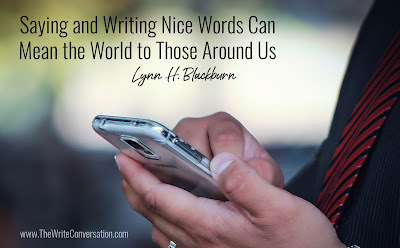
by Lynn H. Blackburn @LynnHBlackburn
When it comes to love languages, I’m a words of affirmation girl all the way. Don’t get me wrong…gifts and acts of service are a close tie for second and I will never say no to either of them.
But my core self craves affirmation. This is a fact.
Here’s another fact: I avoid conflict whenever possible. I’m a solid Enneagram 9, and I just want everyone to get along. PLEASE. :)
So this past weekend, when someone decided to mess with my email and send out some spam about weed eaters, I was decidedly ill-equipped to handle the barrage of hate mail that flooded my inbox.
This isn’t a post about protecting your email. Bottom line, make sure your password is as strong as it can be. Change it if it’s been a while. And if two factor authentication is an option, use it. Beyond that, there’s really not much you can do.
Moving on.
When the first hateful email hit, I thought it was a fluke. Then they kept coming. These folks were fed up with the spam in their inbox and to convey that, they chose to respond in vile, hateful, crude, and in a couple of cases, truly disturbing ways.
I mean, I get it. I don’t like spam either. And I’m sure they have no idea that when they replied to the email, that their response was going to a person who was just as much a victim of the situation as they were. But…wow. Some of the things they suggested I do indicated that there are some very broken people out there in the world.
It also drove home how much unkind words—even when I know I did nothing wrong and don’t deserve them and they don’t actually apply to me—can hurt.
But guess what else happened?
I received a lovely email from a young reader. The email was from her, but written from what I’m guessing is her mom’s account. She told me how much she loved my books, especially my last one and how she’d convinced her parents to drive 90 minutes to go to a bookstore that carried it.
Y’all. 🥰
I responded. Told her thank you. Offered to send her some stickers if she didn’t mind sending me her mailing address.
Her response was that my email had made her day.
I literally cannot tell you how desperately I needed her words of encouragement this weekend. Because while my rational brain knows those hateful emails weren’t really for me at all, I read them and they were like a poison worm in my spirit.
But that one email from a kind soul helped keep the evil at bay.
So today, tonight, this weekend, let me encourage you to do something.
Take a minute and email your favorite author. Just send them a few lines. Tell them you appreciate them and that you’re praying for them. If you particularly loved a storyline or you’re excited for an upcoming release, tell them.
As writers, you know this is true. You know that no matter what their social media indicates or what they shared in their last newsletter, their real life is complicated and, at times, messy.
Your words might be the very words they need to keep writing the words that God has given them.
And that matters.
Because there are some very sad people out there. They need Jesus. They need hope. They need stories that bring joy and peace and encouragement.
So write the email. Send the note. Comment on the blog post. Respond to the newsletter. React to their social media.
Say nice things.
It matters. Maybe more than you know.
TWEETABLESaying and Writing Nice Words Can Mean the World to Those Around Us, insight from @LynnHBlackburn on @EdieMelson (Click to Tweet)
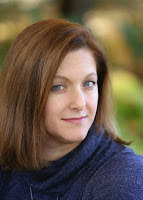 Lynn H. Blackburn loves writing romantic suspense because her childhood fantasy was to become a spy, but her grown-up reality is that she's a huge chicken and would have been caught on her first mission. She prefers to live vicariously through her characters and loves putting them into all kinds of terrifying situations while she's sitting at home safe and sound in her pajamas!
Lynn H. Blackburn loves writing romantic suspense because her childhood fantasy was to become a spy, but her grown-up reality is that she's a huge chicken and would have been caught on her first mission. She prefers to live vicariously through her characters and loves putting them into all kinds of terrifying situations while she's sitting at home safe and sound in her pajamas! Unknown Threat, the first book in her Defend and Protect series, was a 2021 Christy Award finalist and her previous titles have won the Carol Award, the Selah Award, and the Faith, Hope, and Love Reader’s Choice Award. Malicious Intent, the second book in the series, released March 2022.
She is a frequent conference speaker and has taught writers all over the country. Lynn lives in South Carolina with her true love and their three children. You can follow her real life happily ever after by signing up for her newsletter at LYNNHBLACKBURN.COMand @LynnHBlackburn on BOOKBUB, FACEBOOK, TWITTER, PINTEREST, and INSTAGRAM.
Published on September 06, 2023 22:00
September 5, 2023
Using the Beauty of Triangles in the Stories We Write
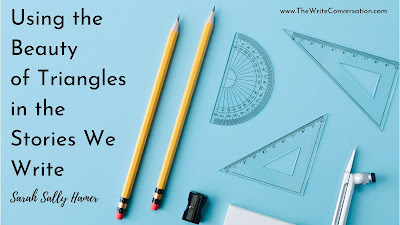
by Sarah Sally Hamer @SarahSallyHamer
I often get asked in my classes how many characters a book should have. Answering that is usually easy—as many as you need—but I always try to follow up with a question for the writer. How long is the story? Because that can be a huge factor. Not only that but, as Ronald B. Tobias suggests, each character should “relate and depend” on the others. We can’t separate characterization from plot or action or incidents. Keeping all this straight is where triangles “step in and save the day.”
The dynamics of plot and characterization require that a character DO something. It can be something as simple as walking down the street or as complex as a premeditated murder. A minimal story may only have one character, but that character MUST interact with something or someone. Old Man and the Sea by Ernest Hemmingway concentrated on one human character but he had conflict (creating plot) against the ocean itself, a large fish, and even a shark before the story was done. Each are relationships that work for and against each other to create the story.
The movie, Ghost, with Demi Moore, Patrick Swayze, and Whoopi Goldberg is an excellent example of how three main characters interact and build a story full of conflict and intrigue. Briefly, Sam and Molly are in love but Sam is murdered. Molly is in danger and so Sam, who is now a ghost, has to find a way to protect her but Oda Mae, a con artist, is the only one Sam can communicate with. So, Oda Mae has to convince Molly that she is in danger.
Each one of these three characters (and, of course, there are more in the story but they are less important), has something to lose and the tension escalates as the danger to Molly grows.
 So our triangle will have each of these three characters on one point.
So our triangle will have each of these three characters on one point. The top point is always the protagonist. In this particular story, each character is a protagonist in their turn, but we’ll start with Molly. Molly’s interactions (scenes) with Sam prior to his death show their love for each other. Their life together seems almost perfect. But, upon Sam’s death, Oda Mae shows up with a totally unbelievable story that Sam is a ghost using her to communicate with Molly. So, we have tension on all three sides – Molly grieving Sam’s death and refusing to believe Oda Mae is telling the truth, Sam trying to get Oda Mae to cooperate and to tell Molly about her danger, and Oda Mae in the middle just trying to get rid of the crazy voice in her head. Their complex and detailed relationships are what make the movie work so well because the audience can relate to the ups and downs of the story as we watch the characters struggle, each in their own way.
The beauty of all this is that each incident in the story is a direct result of the character’s need to communicate, to cooperate, or to learn something important. By pitting the characters against each other, or forcing them to get along to solve a problem, a writer is able to create deeply interesting and committed relationships.
Each relationship and each scene will need their own triangle. Who is in the scene? Who is the protagonist, who is the “helper,” and who is the conflict? Sam isn’t in a lot of scenes, but other people step up. For instance, once Sam’s murderer realizes Molly knows what happened, he has to kill her too. So Oda Mae is now completely on Molly’s side of the triangle, trying to keep that from happening. Sam then steps into the triangle, replacing Oda Mae, and saves Molly. Each scene morphs as the story demands it to and triangles help to picture it as we write.
And, the triangles turn, with different people in different aspects as the story unfolds, with the relationships evolving as they need to.
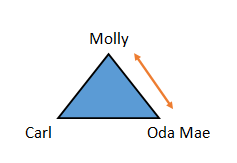 Triangle 2
Triangle 2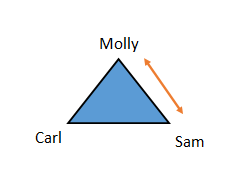 Triangle 3
Triangle 3Although Tolkien may not have thought in triangles like I do, he uses them with a master’s touch. Frodo, Samwise Gamgee, and Gollum are a perfect example of how the triangles work. But Frodo also is on other triangles, because he has other relationships all the way through the movies. Gandalf is his mentor, Aragorn his protector. And, of course, there are plenty of evil characters to create tension and conflict.
Of course, you can choose any book or movie and make triangles for practice. How do the characters relate to one another?
Then, how would you use this in your own story? Draw a triangle! Put your main protagonist on the top point. Who will be this character’s main ally? Who will be the main conflict? How will these three characters interact? Are there more characters who will need to be introduced? How will that affect the three we’ve already created? We build characters in as we need them—as many as we need for the story to move forward—aligning them in “threes”—creating a “good” or a “bad” choice for the character to make.
I learned this technique of how to deal with relationships from two books that Ronald B. Tobias wrote—20 Master Plotsand Theme and Strategy. I recommend both.
How do you create relationships in the stories you write?
TWEETABLEUsing the Beauty of Triangles in the Stories We Write - @SarahSallyHamer on @EdieMelson (Click to Tweet)
 Sarah (Sally) Hamer, B.S., MLA, is a lover of books, a teacher of writers, and a believer in a good story. Most of all, she is eternally fascinated by people and how they 'tick'. She’s passionate about helping people tell their own stories and has won awards at both local and national levels, including two Golden Heart finals.
Sarah (Sally) Hamer, B.S., MLA, is a lover of books, a teacher of writers, and a believer in a good story. Most of all, she is eternally fascinated by people and how they 'tick'. She’s passionate about helping people tell their own stories and has won awards at both local and national levels, including two Golden Heart finals.A teacher of memoir, beginning and advanced creative fiction writing, and screenwriting at Louisiana State University in Shreveport for over twenty years, she also teaches online for Margie Lawson at www.margielawson.com. Sally is a free-lance editor and book coach, with many of her students and clients becoming successful, award-winning authors. You can find her at hamerse@bellsouth.net or www.sallyhamer.blogspot.com
Published on September 05, 2023 22:00
September 4, 2023
What About Profanity When Writing Dialogue?

by PeggySue Wells @PeggySueWells
By the time she was ten years old, my daughter had surpassed all the art instruction I could give. At a local art show, she considered the pieces on display and pointed to a group of portraits. “I could learn from that artist.”
And so she began group lessons at the artist’s studio. When I picked her up after the first class, my daughter eagerly described the new techniques she learned and finished with, “And there is a little old lady who swears like crazy.”
The following week, the instructor and I talked about my daughter’s progress. “She mentioned that one classmate is particularly colorful,” I said.
The instructor nodded. “When your daughter joined the class, that student really cleaned up her language.”
To use or not to use. What does a writer do with the question of profanity? Writing about our artistic little old lady with the surprising vocabulary, what words get included in the dialog?
When writing about a street gang, an author wants to portray the character authentically. To do anything less will lose readers. When author and filmmaker Frankie Schaeffer produced faith-based films, his biggest challenge was to make a product a church would show while portraying characters realistically. After all, what uncouth bad guy is believably going to say, “Golly gee whillikers”?
Language is a non-issue for some writers, and some publishers have policies that require no profanity. Additionally, to include such words limits the audience. There are readers who prefer family friendly works. Projects with mature content is not recommended for younger readers.
So what does a writer do when writing realistically about a character whose language would be populated with profanity? What about those shocking plot points that would illicit such an exclamation even from a character who is not known for using such terms?
Options for Handling Profanity When Writing DialogueUse a grawlix, the series of keyboard characters that often appear in place of profanity. Think of the symbols as graphically bleeping out unacceptable words. This is often seen in comic books as #@*%.Use the term that describes for the reader what is said. The faces of his two sisters filled Michael’s mind and he cursed.Another term to describe for the reader what is said. He swore.Hint at what is said. “You son of a…” Marc swung his fist into the man’s nose. A similar way to hint at what is being said. “Son of a…” the oath seamlessly streamed into another language that Marc guessed to be Arabic.Using profanity just for the sake of using such words is lazy writing and tiresome for the reader. What other ways can you use to show who the character is while remaining family friendly? How can you show the seriousness of the situation without the use of profanity?
TWEETABLEWhat About Profanity When Writing Dialogue? Insight from @PeggySueWells on @EdieMelson (Click to Tweet)
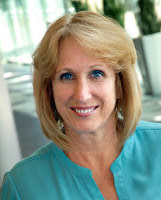 Tropical island votary and history buff, PeggySue Wells parasails, skydives, snorkels, scuba dives, and has taken (but not passed) pilot training. Writing from the 100-Acre Wood in Indiana, Wells is the bestselling author of thirty books including The Slave Across the Street, Slavery in the Land of the Free, Bonding With Your Child Through Boundaries, Homeless for the Holidays, Chasing Sunrise, and The Ten Best Decisions A Single Mom Can Make. Founder of SingleMomCircle.com, PeggySue is named for the Buddy Holly song with the great drumbeat. At school author visits, she teaches students the secrets to writing and speaks at events and conferences. Connect with her at www.PeggySueWells.com, on Facebook at PeggySue Wells, and LinkedIn at linkedin.com/in/peggysuewells
Tropical island votary and history buff, PeggySue Wells parasails, skydives, snorkels, scuba dives, and has taken (but not passed) pilot training. Writing from the 100-Acre Wood in Indiana, Wells is the bestselling author of thirty books including The Slave Across the Street, Slavery in the Land of the Free, Bonding With Your Child Through Boundaries, Homeless for the Holidays, Chasing Sunrise, and The Ten Best Decisions A Single Mom Can Make. Founder of SingleMomCircle.com, PeggySue is named for the Buddy Holly song with the great drumbeat. At school author visits, she teaches students the secrets to writing and speaks at events and conferences. Connect with her at www.PeggySueWells.com, on Facebook at PeggySue Wells, and LinkedIn at linkedin.com/in/peggysuewells
Published on September 04, 2023 22:00
September 3, 2023
A Tongue-in-cheek Post for Writers: 10 Reasons Not to Write Books for a Living
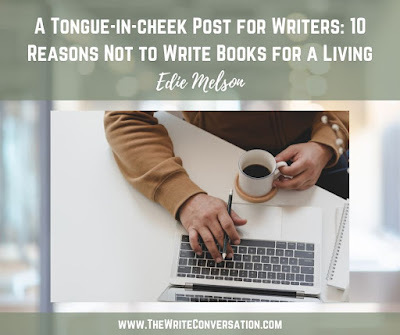
by Edie Melson @EdieMelson
I wish I had a dime for every person who's ever said, "I should write a book." But the truth is that not everyone has what it takes to write books for a living.
There's something intriguing about the idea of being novelist. But the truth is a long way from the romantic way writing is portrayed in TV and film. So for those of you considering the profession, or who are already here and are considering getting out, I have some thoughts.
10 Reasons NOT to Write Books for a Living
1. You want to make a lot of money. Truth is, writing books, I’m still not breaking even. Freelancing is a different story. But books, well…not so much.
2. You chose this profession because you mom said you were the best writer ever. There are a lot of reasons to become a writer, and family support is important. But truthfully your mom probably isn’t an unbiased advocate.
3. You want job where you can stay at home and have a life. I work harder and put in more hours as a writer than I EVER did at a traditional job. Writing is my life.
4. You want fame (to go along with the fortune in #1). There are more ways than ever to find your 15 minutes of fame. But writing a book isn’t one of them.
5. You enjoy talking about writing more than the actual writing. Writing groups are full of these folks. They enjoy the creative atmosphere, but are unwilling to actually sit down and commit words to paper.
6. You want to do something where you’re the boss. Yes, you will be working for yourself, and writing novels does give you control over how you schedule your time. But once you begin selling a project, everyone else seems to have more input than you. Your agent, your editors, even the bookstores carry more weight than you.
7. You don’t take criticism well. Professional writers know the best way to get better is by listening—with an open mind—to suggestions. None of us like being told we can improve. Professional writers want to get better more than they want their egos stroked.
8. You hate to read. Good writers read. Argue all you want, but that’s just a fact.
9. You can’t stand rejection. Editors and agents reject manuscripts for a variety of reasons, and it often has nothing to do with how well written it is.
10. You can be satisfied doing something other than writing. The truth is, if you can imagine doing anything else, do it.
How about you, can you add any more reasons not to become a novelist to my list?
Don’t forget to join the conversation!Blessings,Edie
TWEETABLE10 Reasons Not to Write Books for a Living from author @EdieMelson (Click to Tweet)
 Edie Melson is a woman of faith with ink-stained fingers observing life through the lens of her camera. No matter whether she’s talking to writers, entrepreneurs, or readers, her first advice is always “Find your voice, live your story.” As an author, blogger, and speaker she’s encouraged and challenged audiences across the country and around the world. Her numerous books reflect her passion to help others develop the strength of their God-given gifts and apply them to their lives.Connect with her on her website, through Facebook, Twitter and on Instagram.
Edie Melson is a woman of faith with ink-stained fingers observing life through the lens of her camera. No matter whether she’s talking to writers, entrepreneurs, or readers, her first advice is always “Find your voice, live your story.” As an author, blogger, and speaker she’s encouraged and challenged audiences across the country and around the world. Her numerous books reflect her passion to help others develop the strength of their God-given gifts and apply them to their lives.Connect with her on her website, through Facebook, Twitter and on Instagram.
Published on September 03, 2023 22:00
September 2, 2023
Encouragement When You Feel Like a Late Blooming or Never Blooming Writer
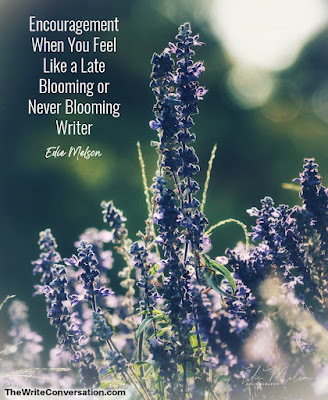
by Edie Melson @EdieMelson
For the gifts and the calling of God are irrevocable. Romans 11:29
Do you ever feel like you missed your chance? Or maybe you struggle because life interfered and your writing timetable has gotten so far behind you may never get back on track?
I think we’ve all been there.
But I’ve come to understand that feeling is rarely accurate—at least it’s never the whole picture. With God, there is so much more to consider.
This truth was brought home to me on a trip to the Blue Ridge Mountains a few years ago. We went during an in-between time—too late for summer blooms and too early for fall colors.
At least that was what I expected.
Instead we were amazing by the variety of late blooming flowers and the beauty they added to that in-between-time. As I marveled at the gorgeous blossoms, God used this time to illustrate an important life lesson for me.
First, He remind me that HIS timing is always perfect. These wildflowers weren’t blooming late. God ordained them to blossom at that specific time and place.
As I snapped a myriad of beautiful pictures, it wasn’t just the sight that inspired me, I was also surrounded by the rich aromas from so many different flowers. Some of the flowers I recognized as right on the natural timetable, but others were ones that were growing in protected areas and caused by circumstances to flower at that specific time.
I realized I needed to remember this truth. Because just like these flowers, my writing is on God’s timetable, not mine. And so often what I think of as late, is NOT out of sync with God’s plan. I’ve experienced times when God has postponed certain things in my life for a specific purpose. God’s plans are always so much richer than mine. He doesn’t consider just me, He is also looking at all the people who will be impacted at a certain time and place.
The truth is this, whenever we let our writing bloom on God’s timetable He uses us to make the world a more beautiful place and bring forth the aroma of Christ.
TWEETABLEEncouragement When You Feel Like a Late Blooming or Never Blooming Writer from @EdieMelson (Click to Tweet)
 Edie Melson is a woman of faith with ink-stained fingers observing life through the lens of her camera. No matter whether she’s talking to writers, entrepreneurs, or readers, her first advice is always “Find your voice, live your story.” As an author, blogger, and speaker she’s encouraged and challenged audiences across the country and around the world. Her numerous books reflect her passion to help others develop the strength of their God-given gifts and apply them to their lives.Connect with her on her website, through Facebook, Twitter and on Instagram.
Edie Melson is a woman of faith with ink-stained fingers observing life through the lens of her camera. No matter whether she’s talking to writers, entrepreneurs, or readers, her first advice is always “Find your voice, live your story.” As an author, blogger, and speaker she’s encouraged and challenged audiences across the country and around the world. Her numerous books reflect her passion to help others develop the strength of their God-given gifts and apply them to their lives.Connect with her on her website, through Facebook, Twitter and on Instagram.
Published on September 02, 2023 22:00
4 Superpowers Every Writer Must Have
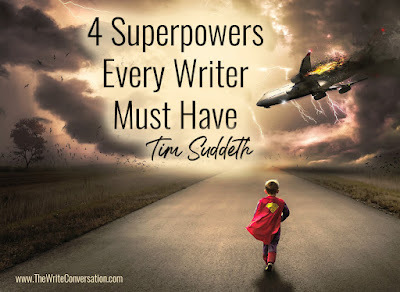
by Tim Suddeth @TimSuddeth
Have you ever wanted to be a superhero? Did you know that writers have superpowers?
I’m sure many of us filled hours of our childhood reading comic books or watching TV shows or movies of storybook heroes. Reading about our favorite spandex-clad hero or heroine crawling out of an escape-proof trap and saving the day for all humanity. Or spending 50 cents for a comic book to see what our hero did this month. I can imagine the comment section below filling up with pictures of us dressed up in our costumes from our childhoods, our teens, or in college.
There’s something about superheroes that catches our imaginations. Having superpowers like flight, X-ray vision, or incredible strength. Maybe having incredible gadgets like Batman’s belt or the Batmobile. Things we would use to help others and see that justice is served.
But these aren’t the only way to be a superhero.
I can’t scale the side of a building like Spider-Man. I can’t talk to whales like Aquaman. And I don’t have a Lasso of Truth like Wonder Woman. (Which is good because I would hate for my wife to get hold of the rope.)
But as a writer, I do have some incredible superpowers.
4 Writing Superpowers
1. Helping Readers Escape Reality
A major reason readers choose fiction is so they can lose themselves in the story and the lives of the characters. Stories set in exotic or popular places enable the reader to travel to faraway places without ever leaving their chair. I’m reading an interesting PI mystery set in Los Angeles that transports me to different tourist sites without having to fight the traffic.
And for the reader, after a tough day at work, refereeing the kids, or just adulting, it’s especially nice to escape into a world with problems that they don’t have to deal with. Instead, let’s see how the character, or the writer, handles the mess. And I’ll make another bag of popcorn.
2. Helping Readers Better Understand Reality
We find that in both nonfiction and fiction, readers want to learn how to better deal with the problems and circumstances that life brings. Self-help books and memoirs show how others have faced the same problems. Christian living books, Bible studies, and devotions teach us biblical principles to our earthly problems. It only makes sense that since our Holy God created us and the world, that we should seek His will when facing problems and seeking His will.
It’s through stories we find in fiction, memoir, and biographies that we encounter the doubts, fears, and joys of others. We can find someone in a situation like ours and experience the trials and hurts with them. It’s funny that even when we know the story isn’t true, we still feel what the characters go through, but at a safe distance. If Murder She Wrote wasn’t fiction, who in their right minds would ever want to move to Cabot Cove?
3. Helping Readers Better Understand Other People
I mean, people are crazy. Well, obviously not you or me. I’m sure we both know the only proper kind of ice cream is Breyers Vanilla. Right? And it should be eaten in a cup, not a cone. Maybe with Coke poured in it.
Calling anything else ice cream is just silly, right? Oh, so you’re one of them, huh?
It’s funny how we often think some things should be done a certain way because that is how our family did it. Or that’s the only way we have ever seen it done. My wife and I still shake our heads when we see each other fold a towel.
But in a book, we can visit another state, a different family, or a foreign country. We can see how people across the world make their meal, or how they did it 300 years ago, or 200 years in the future. We will encounter different points of view, and maybe learn they aren’t so different after all.
4. Helping Readers Spark Their Imagination
Harry Potter gave me a new appreciation of owls. James Bond made me terrified of crocodiles. And The Wizard of Oz taught me not to ride a bicycle in a storm. Or get too close to a monkey.
Sparking imaginations may be our most important superpower. It is an honor to give a student the ability to dream of new opportunities. To give courage to patients or their family while they are in the cancer ward. Or to give hope to someone facing a tough decision. Or an empty house.
Our stories can spark someone’s imagination and help them dream of new possibilities to change their whole life. We have seen how books can influence people over and over again. Maybe even in your own life.
It’s easy to get so caught up in the daily chore of facing a blank screen or dealing with too many social media obligations that we forget why we write. Or how our writing may affect one of our readers. But what a great opportunity writing our stories or experiences gives us to help or influence another person.
Isn’t that what we want our readers to look forward to when they buy our books, read our articles, or pull up our blogs? Choosing to read our stories is like when the police chief turned on the Bat-Signal. Our readers are looking for answers. And isn’t showing that there is hope in a situation the goal of any superhero?
TWEETABLE4 Superpowers Every Writer Must Have from @TimSuddeth on @EdieMelson (Click to Tweet)
 Tim Suddeth is a stay-at-home dad and butler for his wonderful, adult son with autism. He has written numerous blogs posts, short stories, and three novels waiting for publication. He is a frequent attendee at writers conferences, including the Blue Ridge Mountain Christian Writers Conference and a member of Word Weavers and ACFW. He lives near Greenville, SC where he shares a house with a bossy Shorky and three too-curious Persians. You can find him on Facebook and Twitter, as well as at www.timingreenville.com and www.openingamystery.com.
Tim Suddeth is a stay-at-home dad and butler for his wonderful, adult son with autism. He has written numerous blogs posts, short stories, and three novels waiting for publication. He is a frequent attendee at writers conferences, including the Blue Ridge Mountain Christian Writers Conference and a member of Word Weavers and ACFW. He lives near Greenville, SC where he shares a house with a bossy Shorky and three too-curious Persians. You can find him on Facebook and Twitter, as well as at www.timingreenville.com and www.openingamystery.com.
Published on September 02, 2023 00:33
August 31, 2023
Worldbuilding 101 for Writers: Writing Technology and Magic Systems

by A.C. Williams @ACW_Author
If you open a novel and your protagonist is on a spaceship out in some distant galaxy, what genre are you reading? It’s fairly safe to assume it’s science fiction, right? What about if your protagonist is embroiled in a magical dual with a vicious dragon? Safe bet to say it’s fantasy.
Generally, if your story involves more elements of science or elements of technology, it will be science fiction. Likewise, if your story is based around magic or the unseen/unknown usage of a power greater than the characters, it will be fantasy. That’s sounds really straightforward, but as with every element of fiction writing, it’s a lot easier to tell than it is to show. So how does the difference between technology and magic affect your worldbuilding?
So far in this Worldbuilding 101 series, we’ve talked about Existing History, People and Social Circles, Language and Communication, Climate and Geography, Agriculture, Faith and Religion, and, last month, we tackled Government and Economics.
Knowing the differences between technology and magic (as well as their similarities) will make a HUGE impact on how you build your world and how your characters interact with it. That’s why this month we are going to focus on Technology and Magic Systems.
Deciding whether your speculative world is going to include a focus on technology or on magic will dictate a lot of what you write and how you write it.
First off, when we say “magic” what exactly are we talking about here? This is a tricky topic that isn’t the focus of this article (I usually point people to Marian Jacobs’s articles on Lorehaven for a better understanding of fictional magic ).
In nearly every fantasy story, you’re going to find magic. There are elements of it in both the works of Christian greats C.S. Lewis and J.R.R. Tolkien. And, if you don’t feel comfortable using a magic system in your fantasy story, you don’t have to. Some of the best fantasy books I’ve read recently don’t really have anything to do with magic systems (for great examples of these, see the works of Emily Hayse and Claire Banschbach ). Extraordinary fantasy stories without magic of any kind.
But this is for authors who want to reach a readership that expects magic to have a role in fantasy. Magic is a genre expectation of fantasy novels after all.
Whether you choose to use technology as the basis for your speculative society or magic, the same questions apply.
First off, What is its source?
I know that sounds basic, but it’s important. You have to know where your magic or your technology came from.
For technology, did your culture develop the science on their own? Were they given hints or help from another culture? Did they experience a giant leap in technology due to time travel?
For magic, how did the people discover it? Who was the first person to wield it? Does everyone have access to it, or do only a few blessed individual possess the capability?
Depending on how you answer this question will determine the social structure of your world, the government and economics, and the cultural divides. It doesn’t just affect the faith and religion of your people groups. It will affect every element of your society.
Secondly, What does it cost?
Both magic and technology need a cost associated with its use. Again, that sounds like a basic concept, but you would be shocked how many speculative authors don’t consider it.
For technology, where does it get its energy? Generally speaking, technology requires energy in some form to operate. So where does that energy come from?
A great example of science fiction that tackles this question of cost is a Doctor Who episode (there are many shows that do, but this is the first one that comes to mind). It’s an episode from the 2010 series with Matt Smith’s 11th Doctor, called “The Beast Below.” It’s an exceptional treatment of this question.
For fantasy, honestly, the same questions apply as in science fiction. What is the cost of using magic? Is it years that you’ll live? Is it the user’s sanity? Does it cause pain? Does it cause weakness?
I have enjoyed the Wheel of Time books by Robert Jordan, although I’ve only made it seven or eight books into the series. I like the magic system that’s set up, that men who use magic slowly lose their minds the more they access it. The storyline basically sets up Rand al’Thor, the protagonist, as the savior of the whole world, but the cost of saving the world and everyone he loves will be his own mind.
But there’s another side of magic and technology that we ought to touch on, for those of us who like the complexities of complicated stories and worlds. What about magic that turns out to be science we just don’t understand yet?
That’s valid. Actually that’s one of the core elements of my own speculative series, which features five average guys who end up with elemental samurai armors they don’t know how to use.
We don’t really have space to tackle this question in this installment, so we’ll come back to it. Probably next month, so stay tuned!
That being said, keep in mind both the SOURCE and the COST of your magic or technology. Then use it as you develop your character arcs and your plot structure. You’ll find that it informs your characters and your story itself more than you might expect.
TWEETABLEWorldbuilding 101 for Writers: Writing Technology and Magic Systems from @ACW_Author on @EdieMelson (Click to Tweet)
Don't Miss the Other Posts in this Series!
PART 1 WORLDBUILDING 101 FOR WRITERS: DO YOU KNOW THE HISTORY OF YOUR STORY WORLD?
PART 2 WORLDBUILDING 101 FOR WRITERS: WRITING PEOPLE GROUPS AND SOCIAL CIRCLES
PART 3 WORLDBUILDING 101 FOR WRITERS: WRITING LANGUAGE AND COMMUNICATION
PART 4 WORLDBUILDING 101 FOR WRITERS: CLIMATE AND GEOGRAPHY
PART 5 WORLDBUILDING 101 FOR WRITERS: AGRICULTURE
PART 5 WORLDBUIDING 101 FOR WRITERS: WRITING FAITH AND RELIGION
PART 6 WORLDBUILDING 101 FOR WRITERS: WRITING GOVERNMENT AND ECONOMICS PART 7 WORLDBUILDING 101 FOR WRITERS: WRITING TECHNOLOGY AND MAGIC SYSTEMS
 Award-winning author, A.C. Williams is a coffee-drinking, sushi-eating, story-telling nerd who loves cats, country living, and all things Japanese. She’d rather be barefoot, and if she isn’t, her socks won’t match. She has authored eight novels, two novellas, three devotional books, and more flash fiction than you can shake a stick at. A senior partner at the award-winning Uncommon Universes Press, she is passionate about stories and the authors who write them. Learn more about her book coaching and follow her adventures online at https://www.amycwilliams.com.
Award-winning author, A.C. Williams is a coffee-drinking, sushi-eating, story-telling nerd who loves cats, country living, and all things Japanese. She’d rather be barefoot, and if she isn’t, her socks won’t match. She has authored eight novels, two novellas, three devotional books, and more flash fiction than you can shake a stick at. A senior partner at the award-winning Uncommon Universes Press, she is passionate about stories and the authors who write them. Learn more about her book coaching and follow her adventures online at https://www.amycwilliams.com.
Published on August 31, 2023 22:00



